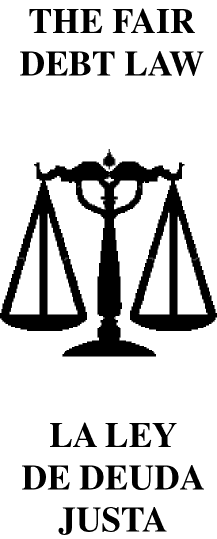The Fair Debt Law - Consumers in Debt Series
A fact sheet that explains the "fair debt law," the law that regulates what actions a collection agency can take in trying to collect a debt from you.

This document may also be available in the following languages: Chinese, English, Korean, Russian, Spanish, and Vietnamese, among others. An Adobe Acrobat (pdf) file (optimized for printing) may also be available in some or all of the above languages. To see what languages and formats this document is currently available in, please check our online Multilingual Library.
Note: Last revision 1992. Use this information as a general guide only; consult with a local consumer group for laws specific to your state.
The Fair Debt Law
The Fair Debt Coilection Practices Act applies to personal, family, and household debts. These are debts such as car payments, medical care, and credit card accounts. The act only covers collection agencies. It does not cover creditors who collect their own debts. This law does not cancel debts that you owe. What it does is limit the ways that can be used to collect payments.
The Fair Debt Collection Practices Act is a law that forbids a debt collector to...
- Threaten you or your family with harm.
- Use obscene words when talking to you.
- Contact you at a bad time, such as before 8:00 a.m. or after 9:00 p.m., or in a bad place, such as at work.
- Telephone you without saying who he/she is.
- Use the telephone to annoy you.
- Give false credit information about you.
- Tell others about your debts.
A debt collector may not lie when trying to collect any debt. For instance, a debt collector cannot...
- Falsely claim to represent the United States government or any state government.
- Falsely claim to be a lawyer.
- Falsely claim to operate or work for a credit bureau.
- Use any false name.
- Falsify the papers being sent to you, such as saying they are legal forms or a summons.
Also, a debt collector may not...
- Say that you will be arrested if you do not pay the debt.
- Say that any action will be taken against you which cannot legally be taken.
- Send anything that looks like an official document of any court or agency of the United States or any local government.
- Use a postcard to write to you about your debts.
- Put anything on the outside of an envelope that says the sender is a debt collector.
However, under the law the debt collector can...
- Contact you in person, by mail, telephone, or telegram.
- Contact any person to locate you, but cannot tell this person that you owe money.
Your Rights
Within 5 days after you are first contacted, the debt collector must send you a letter telling you:
- The amount of money you owe.
- The name of the creditor who has employed him/her to collect the money you owe.
If you send a letter within 30 days after you were contacted saying that you do not owe the money, the debt collector must not contact you again. He/she must then send proof of why you owe the money before trying to collect again.
Copyright, Credits & Usage
© Copyright 1992 Home Economics Department, Institute of Food and Agricultural Sciences, University of Florida, Gainesville
Funded by the National Coalition for Consumer Education and AT&T Consumer Credit Education Fund
Electronic publication produced by Consumer Action
Electronic publication funded by AT&T Universal Card
Published / Reviewed Date
Published: April 01, 1992
Download PDF
No Download Available
Sponsors
AT&T
Filed Under
Copyright
© 1992 –2024 Consumer Action. Rights Reserved.



